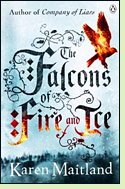The Falcons of Fire and Ice
by Karen Maitland
Reviewed by Margaret Donsbach

The Falcons of Fire and Ice is not your usual Inquisition story. True, the Portuguese Inquisition was as vicious as the Spanish. But Maitland specializes in more supernatural horrors, with chilling beauty woven through them - literally chilling in this case, as a Portuguese falconer's daughter, to save her father, quests to Iceland in search of the prized white gyrfalcon.
This is a plot-driven rather than a character-driven novel, but the characters have snap and originality. Isabela, the falconer's daughter, a girl becoming a woman, is kind-hearted, plucky, intelligent, intuitive, and just a bit naive. Eydis is an oracle, chained to a wall in a cave warmed by a volcanic hot spring; the rural folk who come for her advice - sometimes life-saving, always wise - fear her power as desperately as they need it. Ricardo is a charming con-man with a heart of not-exactly-solid gold. Rounding out the cast are frightened Marranos, evil Jesuits (and at least one evil Lutheran), an emotionally vulnerable boy-king, assorted adventurers, villagers, and a dead spirit who makes Isabela's Icelandic quest as frightening as anything back home. If this were a literary novel, more would be made of an interesting twist: the Inquisition's efforts to purify the faith in Portugal seem thoroughly reprehensible; in Iceland, though, "sometimes mercy is not kindness and pity is not love."
Part of the fun in The Falcons of Fire and Ice are revelations that will change the way readers see some of the characters. In one instance, though, the withheld information seems more confusing than mysterious: readers may puzzle over the number of men who take passage on Isabela's ship all the way to Iceland - three? or four? It's three, and readers will have to guess which one has a dual identity. Also part of the fun are the falconry definitions ("Ruff - when the falcon strikes its prey without seizing it.") at the chapter headings, and the short, unmitigatedly delightful falcon stories sandwiched between chapters. (2012; 499 pages, including Historical Notes and a Glossary with additional historical background)
More about The Falcons of Fire and Ice at Amazon.comOther novels set in Iceland:
Hawk Quest by Robert Lyndon (2012), about an eleventh-century Frankish outlaw who needs four white gyrfalcons to pay a ransom. See review or more info at Powell's Books
Two Ravens by Cecelia Holland (1977), set in twelfth-century Iceland. More info
On the Cold Coasts by Vilborg Davidsdottir (2012), about the love between an unmarried mother and an ambitious priest in fifteenth-century Iceland. More info
Nonfiction about Iceland and Gyrfalcons:
Iceland: Land of the Sagas by David Roberts with photographs by Jon Krakauer (1990). More info
Ring of Seasons: Iceland - Its Culture and History by Terry G. Lacy (1998). More info
The Gyrfalcon by Eugene Potapov (2005). More info
Online:
Gyrfalcons at YouTube
Back to Novels of the Renaissance
Back to Directory of Book Reviews